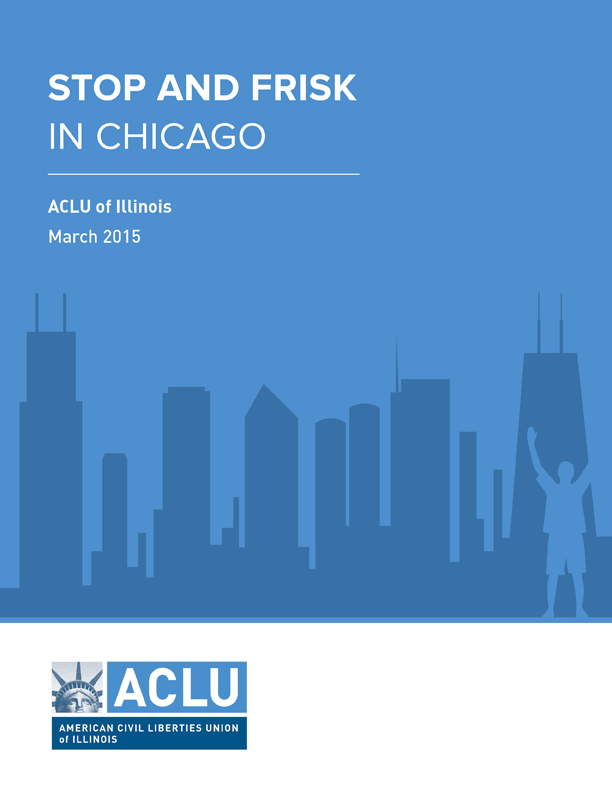The Illinois State Police and the Chicago Police Department each operates a “fusion center” designed to gather, store, and share sensitive information about people and groups suspected of criminal activity. Given the long and troubling history of political spying by police in Illinois, these fusion centers raise profound privacy and free speech concerns. For years, the ACLU of Illinois has monitored these fusion centers, and advocated for improved privacy rules, oversight, and transparency. The ACLU continues to monitor the activities of these centers and call for new guidelines. This report answers common questions about the fusion centers in Illinois, and provides links to pertinent documents.
What is a fusion center?
A “fusion center” is a state or local law enforcement agency that gathers and stores information about people suspected of criminal activity, and shares that information with other law enforcement and intelligence agencies. Almost every state has at least one fusion center. Most fusion centers were created in the wake of the terrorist attacks of September 11, 2011, in order to facilitate information sharing among federal, state, and local law enforcement and intelligence agencies. Much information about fusion centers is unknown to the American public.
How many fusion centers are in Illinois?
Illinois has two fusion centers. The Illinois State Police operates the Statewide Terrorism and Intelligence Center. The Chicago Police Department operates the Crime Prevention Information Center.
What is wrong with fusion centers?
Fusion centers raise substantial civil liberties concerns, because they collect and share massive amounts of sensitive personal information about individual members of the public. Often, this information is collected and shared without adequate safeguards, oversight, and transparency.
These deficiencies can lead to significant problems. Fusion centers in other states have improperly gathered and disseminated information about the lawful expressive activity of various groups and individuals. For example:
Here in Illinois, police agencies have investigated the lawful expressive activity of private groups in the absence of reasonable suspicion that they would break any laws. For example, the Chicago police in 2002 improperly spied on the efforts of the famously nonviolent American Friends Service Committee to plan a lawful anti-globalization protest.
Absent appropriate, necessary guidelines to protect personal privacy, a fusion center might aggravate the harms of such improper political spying. First, a fusion center might store the information gathered through such spying. Later, a fusion center might broadly share such information with many other police departments, intelligence agencies, and even private corporate security offices. This would invade the privacy of people described in such files. It would also chill and deter other people from engaging in expressive activity on controversial matters that might be the subjects of police spying and subsequent fusion center information gathering and dissemination.
How does the State Police fusion center operate?
The Illinois State Police operates the Illinois Statewide Terrorism & Intelligence Center. Created in 2003, it is housed at the State Emergency Operations Center in Springfield. It has scores of employees, including liaisons from numerous federal and state agencies. The scope of its information gathering mandate is very broad: “all-hazards, all-crimes, and all-threats.” This goes far beyond terrorism, or even suspected crime. It shares information through periodic bulletins and reports to many agencies, and in response to queries from particular agencies.
What databases does the State Police fusion center use?
The State Police fusion center has access to and uses dozens of government and private databases containing a vast array of individually identifiable, sensitive information about tens of millions of people.
The State Police fusion center uses several of its own databases. These include:
- The Violent Crime Information Tracking and Linking system (“VITAL”), the fusion center’s internally maintained criminal intelligence data store.
- The Law Enforcement Agencies Data System (“LEADS”), the telecommunications system operated by the State Police, and used by many hundreds of law enforcement agencies in Illinois.
Moreover, the State Police fusion center has access to many databases operated by other law enforcement agencies, at the federal, state, and local levels. These include:
- The FBI’s National Crime Information Center (“NCIC”), Regional Data Exchange System (“R-DEx”), and Law Enforcement Online (“LEO”).
- The DEA’s El Paso Intelligence Center (“EPIC”).
- The TSA’s Transportation Information Sharing System (“TISS”).
- The U.S. Department of Homeland Security’s Homeland Security Information Network (“HSIN”).
- The U.S. Treasury Department’s Financial Crimes Enforcement Network (“FinCEN”).
- The U.S. Secret Service’s Targeted Violence Information Sharing System (“TAVISS”).
- The Illinois Department of Corrections’ Offender Tracking System (“OTS”).
- The Chicago Police Department’s Citizen and Law Enforcement Analysis and Reporting System (“CLEAR”).
The State Police fusion center also has access to many government databases from outside the law enforcement community. These include the Illinois Secretary of State’s databases of digital photographs, including drivers’ license photographs.
Finally, the State Police fusion center has access to the databases owned and operated by private data mining corporations. These include Dun and Bradstreet, Experian, ISO ClaimSearch, and Lexis-Nexis (including its subsidiaries Accurint and ChoicePoint). These private databases provide non-criminal information about millions of innocent persons, including their identifying information, employment and medical history, property, licenses, credit, and neighbors and relatives. In other words, private corporations are mining all of the publicly available data about tens of millions of innocent Americans, and then the Illinois State Police fusion center is accessing this massive amount of information by subscribing to these privately owned databases.
What is the relationship between the State Police fusion center and the Illinois National Guard?
There is a memorandum of understanding between the Illinois National Guard and the Illinois State Police, regarding the Guard’s support for law enforcement. The ACLU obtained portions of this agreement through a lawsuit enforcing a request for records about the fusion center, brought under the Illinois Freedom of Information Act (“FOIA”). During this FOIA suit, the State Police explained that this agreement addresses “investigative techniques” during “joint law enforcement operations” of the Guard and the State Police, and that the agreement was provided to the State Police fusion center.
This agreement between the Guard and the State Police raises civil liberties concerns. Some of our nation’s military organizations in recent years have spied on lawful antiwar protesters – such as the U.S. Department of Defense’s controversial “Talon” program.
Has the State Police fusion center targeted anti-corporate protesters?
In recent years, the State Police fusion center repeatedly provided analytical assistance, and prepared threat assessments, regarding demonstrations against the corporate policies of Caterpillar Inc. During the ACLU’s FOIA enforcement suit, the State Police stated that these assessments make predictions about both lawful and unlawful activity at upcoming demonstrations, based in part on an examination of both lawful and unlawful activity at prior demonstrations. Government examination of past lawful protest activity to predict future lawful protest activity raises profound First Amendment questions.
How does the Chicago Police fusion center operate?
The Chicago Police Department operates the Chicago Crime Prevention Information Center. It was created in 2007. It has dozens of employees, including liaisons from numerous federal, state, and local law enforcement agencies. It mines data from a large number of police and other databases operated by federal, state, and local government. Also, it uses images captured by Chicago’s vast system of video surveillance cameras.
What safeguards should fusion centers have?
Fusion centers should be barred from gathering, storing, or sharing any information about any individual person absent individualized reasonable suspicion that the person is engaged in criminal activity.
This “reasonable suspicion” standard is set forth in federal regulations regarding state and local criminal intelligence databases that receive federal funds. A parallel “reasonable indication” standard is used by the Director of National Intelligence in deciding which “Suspicious Activity Reports” (“SARs”) from state and local police to include within the federal intelligence database known as the “Information Sharing Environment.”
Fusion centers should be barred from gathering, storing, or sharing any information about any individual person due, in whole or in part, to that individual’s race, religion, political beliefs, and the like – unless such information directly relates to criminal activity.
Again, this rule is set forth in both the federal regulation of certain state and local criminal intelligence databases, and the Director of National Intelligence’s regulation of the Information Sharing Environment.
Fusion centers should independently determine the accuracy of information, before they store and share that information.
Otherwise, fusion centers can greatly multiply the harm to innocent people who are the unknowing subjects of inaccurate information. For example, a local police agency might place a person under surveillance, or even arrest them, based on inaccurate information passed through a fusion center. Many of the databases used by fusion centers, including various private commercial databases, are riddled with inaccuracies.
People should be able to find out whether a fusion center is storing information about them and to learn the substance of that information.
If a person believes that a fusion center is storing information about them that is not accurate, the person should be allowed to ask the fusion center to remove that information. If the fusion center refuses to do so, the person should be allowed to place in the fusion center database their own short statement explaining their position that the information about them is not accurate. If the fusion center subsequently shares the allegedly inaccurate information, the fusion center should also share the subject’s responsive statement. Finally, there should be a means for such persons to go to court, and if they can persuade a judge that the information about them is not accurate, to obtain a court order to purge the inaccurate information.
Other necessary safeguards.
Additional necessary safeguards include, but are not limited to: an audit trail of all fusion center activities; annual audits of that activity; rigorous investigation of all alleged misuse; and systematic purging of dated information.
What safeguards are at the State Police fusion center?
The Illinois State Police has a Privacy Policy for its fusion center, obtained by the ACLU through its FOIA enforcement lawsuit. This policy generally appears to require reasonable suspicion to gather, store, or share information. Moreover, this policy generally seems to prohibit gathering information based on a person’s race, religion, political views, or other similar factors.
Pursuant to FOIA, the ACLU has obtained other State Police records that regulate the Illinois fusion center. These include:
- The State Police’s fusion center directives regarding, respectively, inquiry procedures (“STIC-004”), security classifications (“STIC-018”), and internet use (“SOP-007”).
What safeguards are lacking at the State Police fusion center?
Unfortunately, the State Police Privacy Policy abdicates responsibility for ensuring the accuracy of the information that the fusion center obtains from other sources. This Privacy Policy also bars members of the public from learning whether the fusion center is storing any information about them (Id. at Article VIII(E)).
What safeguards are lacking at the Chicago Police fusion center?
The Chicago Police Department has a Privacy Policy for its fusion center, which the ACLU obtained pursuant to FOIA. It has several problems. First, the Chicago fusion center may retain “suspicious activity reports” in the absence of any reasonable suspicion, so long as there is a mere “potential terrorism nexus.” Likewise, the Chicago fusion center may retain other kinds of information based on a mere “possible threat to public safety." These standards are nebulous, and far less protective of privacy and free speech than the time-tested “reasonable suspicion” standard.
Second, the Chicago fusion center may retain information about people based in part on their race, religion, political views, and the like. The Chicago policy only bans retaining information based solely on these suspect considerations (Id. at Part E(2)). Thus, for example, if a Caucasian person and an Arab person are both engaged in identical photography on a public sidewalk (same time, place, subject, and equipment), a Chicago fusion center employee might treat the latter but not the former as suspicious, based in part (though not “solely”) on the latter’s ethnicity. Such distinctions raise First and Fourteenth Amendment concerns, unfairly burden people based on identity and belief, and chill and deter expressive and religious activity.
Third, the Chicago fusion center abdicates responsibility for ensuring the accuracy of the information that it obtains from other sources.
What is the ACLU of Illinois doing about these two fusion centers?
For years, the ACLU of Illinois has closely monitored the fusion centers separately operated by the Illinois State Police and the Chicago Police Department. For example, it has served numerous FOIA requests upon both agencies, and it filed a lawsuit to enforce its FOIA request to the State Police. Also, the ACLU of Illinois repeatedly has advocated for the adoption of better fusion center safeguards to protect privacy. We will continue to monitor these fusion centers, and advocate for better safeguards.
Related Links
|
| Download the following PDF files:
|
Date
Saturday, September 1, 2012 - 2:45pm
Show featured image
Hide banner image
Related issues
Government Accountability and Personal Privacy
Documents
Show related content
Pinned related content
ACLU v. ISP
ACLU seeks privacy records from secretive state police "fusion center"
Report cautions about lack of privacy safeguards in operation of Illinois’ shadowy fusion centers
Tweet Text
[node:title]
Type
Menu parent dynamic listing
Style
Standard with sidebar




